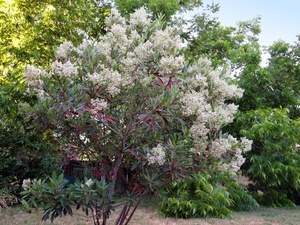 Toyon (Heteromeles arbutifolia) blooming in a garden. Photo by queerbychoice.
Toyon (Heteromeles arbutifolia) blooming in a garden. Photo by queerbychoice.
Toyon (Heteromeles arbutifolia) is a drought-tolerant evergreen shrub that is native to Woodland. Toyon Drive is named after it. Toyon is planted at East Regional Pond, Everman Park, John Ferns Park, and Woodside Park. It is also planted as a street tree on Quail Drive.
Toyon is a type of pome fruit, closely related to Apple trees, Cotoneaster, Hawthorn trees, Photinia, and Pear trees. Toyon is most closely related to Photinia, having been at times grouped into the same genus and called by the obsolete name Photinia arbutifolia.
A member of the rose family, toyon is quite showy, covered in white flowers every spring and covered in red berries every fall and winter - unless you'd prefer yellow berries, in which case you can buy the 'Davis Gold' cultivar, which produces yellow berries.
Toyon berries are edible, but since they're not particularly delicious, most people let the berries function as bird feeders, attracting a more interesting variety of birds for birdwatching than standard birdseed might be likely to do. The berries contain small amounts of cyanohydrins that are converted into cyanide during human digestion. The cyanohydrins can be removed by cooking the berries before eating them; however, toyon berries are commonly served raw in indigenous Californian cuisine, because they are unlikely to cause ill effects when consumed in small quantities.
Toyon is a safe gardening option for hay fever sufferers. It ranks only 3 out of 10 on the Ogren Plant Allergy Scale, indicating that it is fairly unlikely to provoke allergic reactions.
Most of Woodland is within the native range of Toyon as shown on Calscape: roughly everywhere in Woodland that is south of Beamer Street (and its sister streets, West Beamer and East Beamer) and also everywhere in Woodland that is west of East Street is within Toyon's native range.
Toyon usually grows about 6 to 8 feet tall but can grow to as much as 30 feet tall in some cases. When happy, toyon shrubs can grow very quickly. They prefer full sun to partial shade and can tolerate a wide variety of soil types. They can be pruned as hedges.
Like Pear trees, Apple trees, and other plants in the rose family, toyon can contract fire blight, a bacterial disease that primarily affects pome fruits and exclusively affects members of the rose family. The disease is treated by removing all infected plant parts and sterilizing the pruning shears. In the case of toyon, coppicing is a viable treatment option.


